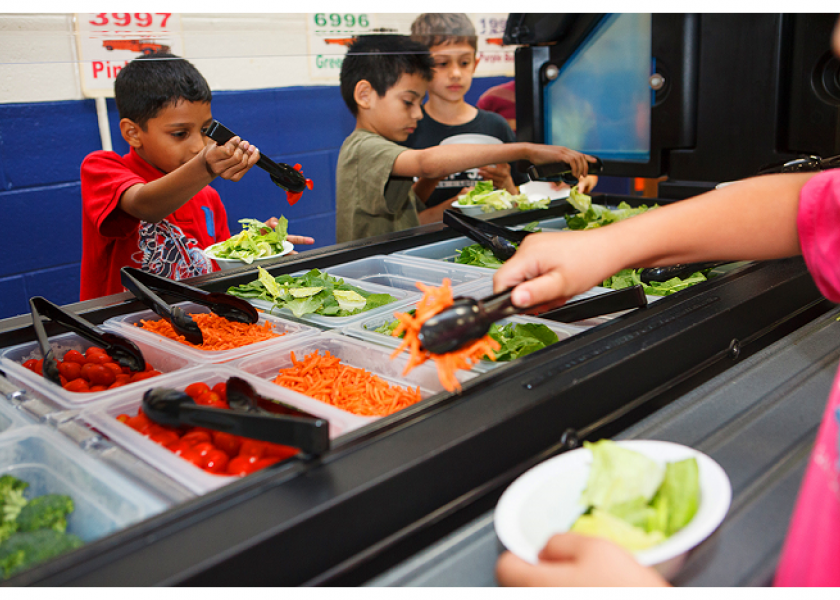USDA plan changes fruit, vegetable rules for school meals

(UPDATED) The U.S. Department of Agriculture is proposing changes to school meal programs that could limit the variety of vegetables served at lunch and cut fruit servings at some breakfasts.
The changes, announced Jan. 17, give school foodservice operators more flexibility and will lead to less food waste, according to the USDA.
The USDA published the proposed changes on the Federal Register website on Jan. 23, starting a 60-day comment period.
Mollie Van Lieu, senior director of nutrition policy for the United Fresh Produce Association, which supported the Obama administration’s changes to school nutrition guidelines, said those changes have been successful in boosting consumption of produce.
“Students are eating more fruits and vegetables, and they are eating a wider variety of them,” Lieu said.
Before lunch standards were revised in 2012, schools were required to serve a half-cup to three-fourths of a cup of fruits and vegetables combined each day. The new standards increased that to three-fourths to one cup of vegetables plus a cup of fruit a day.
Vegetable sub-groups were also added to boost the variety of vegetables served: dark green, red/orange, peas and beans (legumes), starchy and other. An example cited in the USDA’s 168-page proposal shows a cut to the red/orange vegetable requirement of 1.25 cups a week to a half-cup a week.
The USDA stressed that total vegetable servings would stay the same, at one cup a day and five a week. However, the proposal would give districts the choice to fulfill up to 3 of those cups a week with any category, such as the starchy group, at the high school level.
School breakfasts served outside of the cafeteria can drop the daily requirement of one cup of fruit a day to a half-cup, to curb food waste concerns voiced by school foodservice administrators, according to the USDA.
But the proposal also makes permanent a policy enacted in early 2019 that allows schools to switch fruit requirements at breakfast to any vegetable group, including potatoes or other starchy vegetables.
Lieu said the said addition of vegetable sub-groups to school meals led to healthy eating successes at schools. The Healthy Eating Index, which assigns scores to meals based on how consistent they are with the Dietary Guidelines for Americans — had a 21% rating for green vegetables before the subgroups were added to the guidelines and 72% after, Lieu said.
Critics in the media focused on a change to the “competitive foods” rule, saying the proposal would allow districts to sell pizza, burgers and similar foods as a la carte items for a longer period.
“United Fresh believes that students and schools are best served when kids are eating a well-balanced meal,” Van Lieu said. “Any a-la-carte or “competitive foods” should maintain high, or higher, nutrition standards if they are not being served a (Dietary Guidelines for Americans)-consistent meal.”
A statement from the Center for Science in the Public Interest said potato industry lobbyists have pushed for the changes, essentially pushing healthier vegetables off plates for fries or other potato products.
The National Potato Council released its own statement listing the nutritional benefits of potatoes.
“We are pleased to see that USDA is listening to school professionals and allowing a wider variety of vegetables, including potatoes, to be served,” Kam Quarles, NPC CEO, said in the statement. “School foodservice directors have told us that potatoes can be used to introduce children to other types of vegetables, increase school breakfast participation and decrease food waste, while providing students food they like in creative forms.”
The news from the USDA came as a surprise to United Fresh, coming immediately after the United Fresh Start Foundation’s annual conference, Jan. 14-16, in Tucson. The event promotes the goal of increasing access of fresh fruits and vegetables for children.
It’s not the first time the Trump administration has expressed interest in changing the fruit and vegetable standards, she said. Rules concerning milk and whole grains were amended in 2018, and deadlines for sodium decreases were put back.
The administration backed off plans to change fruit and vegetables rules after pushback from the industry and health and consumer groups.
“There was an outcry around that, so they stepped away from those plans,” said Lieu.
Related stories:
Veg, fruit standards for school meals remain intact







